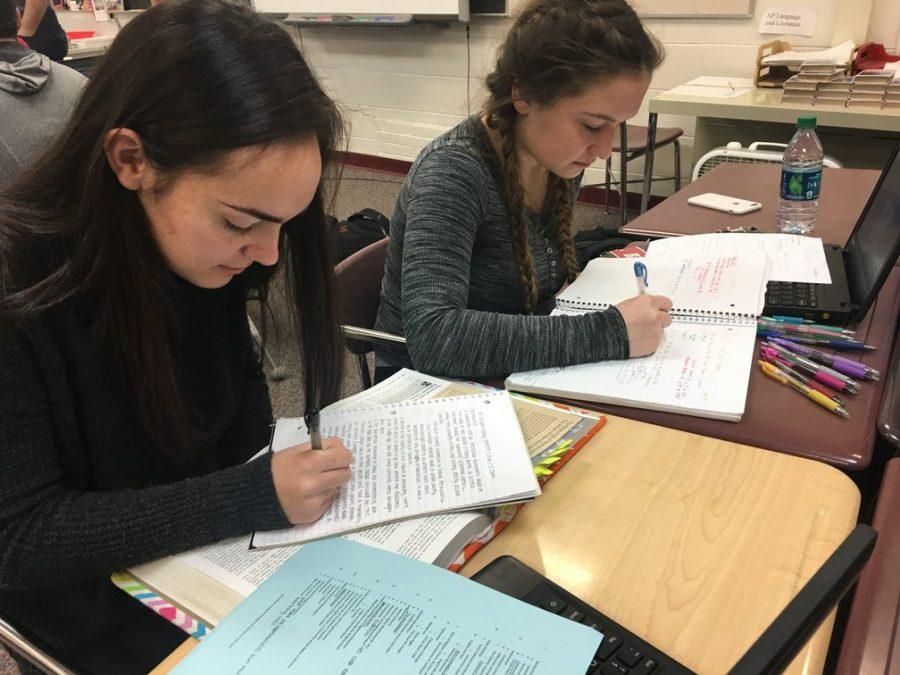Make your time valuable by studying right
January 20, 2017
With dreadful exams approaching, students often find themselves frantically trying to remember information from the past five months. As it seems like exams often come out of the void, students rely on procrastination, little sleep, and a whole lot of cramming to do well.
Cramming for a test the night before may work for certain quizzes that are small, memorization-based; however, cramming isn’t necessarily efficient when it comes to a whole semester of information.
Luckily, although everyone studies differently, there are tips and tricks students can take advantage of to successfully prepare for upcoming exams.
Tip 1: Organize your studying
When it comes to trying to study for multiple exams, it’s important to organize and plan out your studying. Make a To-Do list of all assignments you have to complete and make note of when each is due. That way, you can prioritize what will take the longest and make sure you’re completing all your assignments on time.
Write down both what you need to do in order to study for each subject and how much time you will need. By seeing how much studying you need for each class, you’ll be able to emphasize which subjects will require the most effort. Find a balance of time to spend on each class and plan what you’ll study each day and for how long.
Tip 2: Take adequate breaks
Just like trying to study for a whole semester in a short amount of time isn’t useful, neither is spending all day every day studying. According to a study done by psychology professor Dr. Marty Lobdell at Pierce College, your ability to remember information begins to dwindle after 25-30 minutes. Therefore, studying should be split up into multiple, smaller periods as opposed to trying to study for five hours straight.
An efficient way to study is to work diligently with no interruptions in chunks of 20 minutes. In between study sessions, USA Today recommends rewarding yourself with enjoyable breaks such as checking your Twitter feed or grabbing a healthy snack.
Tip 3: Get enough sleep the night before
Although the National Sleep Foundation says that teen’s optimal performances come from having eight to nine hours of sleep, students frequently fail to get that much sleep each night. Some students believe relying on little sleep to give them an extra few hours of studying will help them.
However, research shows that this technique does more harm than good. Research done by Child Development found that students who lost sleep to gain extra study time typically had more academic problems the next day as opposed to students who got the recommended eight to nine hours of sleep.
“I don’t know how I would survive finals if I didn’t get enough sleep,” said junior Harvey Freed. Freed explained that he tries to get at least seven or eight hours of sleep each night, especially during finals. “I know I don’t do well when I’m tired, so I try to make sure I’m not going to bed too late,” said Freed.
Tip 4: Review and rewrite notes
Take advantages of any notes, handouts, or worksheets given throughout the semester and review them. While rereading old notes, highlight or star important concepts you’ll need to know. For subjects that involve solving problems, such as a math class, practice solving example problems that you’ve already done just to refresh your memory.
For needed subjects, rewrite your notes again. According to the Association of Psychological Science, students who physically rewrite notes receive a memory boost. Just by redoing notes, or even just rewriting the important topics, you’ll be able to make them neater and more organized while also helping yourself study.
Tip 5: Ask for help when needed
It’s okay to ask for help. While going over review packets or old notes, ask if you’re unsure about certain topics. Teachers are there to help you, so ask away. By sitting down and talking with teachers, you’ll be able to clarify concepts and also show teachers you’re dedicated and care about your exams.
If you and a few friends are stuck on the same subjects, meet up and study together. Helping each other and hearing the information clarified from another student can be easier than having a teacher explain it.
¨Pre-calc was something that I just couldn’t figure out by myself,” admitted junior Chloe Harrell. “I asked a few of my friends who took pre-calc last year for help and we all met at Starbucks.” Harrell explained that being in an atmosphere with her friends not only relaxed her, but it helped her understand everything better.
Studying for finals can be stressful, but only if you let it be. By planning out your studying and rewarding yourself with breaks, you’ll be able to make the most of your studying and actually get to sleep at decent times each night. Review notes, ask for help if you’re confused, and remember that finals will all be over soon.
